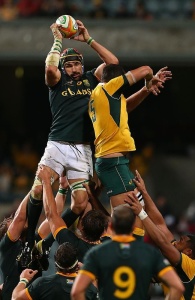
Victor Matfield wins a lineout ahead of an Australian rival in Perth two weeks ago.
South Africa’s aggressive new breakdown tactics will leave them exposed to penalties and short on tacklers out wide, the Wallabies believe, while Australia’s forwards coach Andrew Blades has taken aim at Victor Matfield for trying to manipulate referees.
The Wallabies woke up in Cape Town to headlines of their scrum “tricks” and articles suggesting they manipulated referees into giving them penalties rather than earning them.
And still ringing fresh in their ears is Matfield’s comments after his side lost 24-23 in Perth three weeks ago, in which he questioned the legality of the Wallabies’ tactics in stopping the Boks’ rolling maul.
Blades brushed off the barbs as Australia prepares to face South Africa this weekend at Newlands, where they have not won since 1992.
Fox Sports
“Victor is very good at manipulating that situation and trying to create something in the back of peoples’ heads,” Blades said.
“You even watch it in-game, when he plays for the Bulls, if someone stops their drive he’s straight across to the referees’ assistant to give him his thoughts, and often at the next lineout there’s a penalty when nothing’s happening.
“That’s just the value of experience. He is a great lineout exponent, probably one of the best ever, and that’s why he is able to control the way the game is played around the lineout.
“We’re expecting them to put loads of pressure on the referees around that.
“We looked back at it, and it wasn’t like we were doing anything illegal so we’re happy with that as one of the tactics we take in.
“But we also understand that the pressure we put on, there’ll probably be a penalty against us.”
And as for the scrum assertions, Blades said: “We get that from a lot of teams, they try to look at the fact that if Australia has success in the scrum it must be because they’re doing something illegal.
“That’s just a standard thing we get most weeks, everyone just gets on with it, we’re not worried about it.”
Blades declared that the Boks could have discipline problems of their own after adopting a turnover-frenzy mentality, when everyone from hookers to backrowers to wingers are challenging for pilfers on most tackles rather than picking and choosing at intermittent times like Australia.
“When you do that, you’re living on the edge often, you’re often giving away a lot of penalties for not releasing the tackled player,” Blades said.
“So when you really go hard at the ball, often you can get penalised heavily and I guess that’s one of the weaknesses.
“Also, sometimes when you’re all going at the ball you can overcommit in rucks and leave the next defensive line short.
“You always look at those sort of things as you go along.”
Blades added: “Everyone knows that when you play South Africa it’s probably going to be your biggest physical challenge of the year, so you always have your head around that.
“They got [11] turnovers against the All Blacks, it’s a big focus now when you’re playing them.
“Traditionally you’d always say South Africa play with a big backrow so you run them around and you’re generally stretching yourselves and sometimes getting isolated with the ball.
“The change of profile has created a major rethink when we play them, how much better they are in that area of the breakdown.
“The big thing for us will be to be really efficient around that tackle area and denying them access to the ball defensively.
“We’ve got to be really good in the way we chase each other into the tackle area and deny them those opportunities to turn over the ball.”
The Boks have lost star flanker Francois Louw to injury, but Blades countered: “[Marcell] Coetzee is still there, and [Duane] Vermeulen is getting better and better, he’s got a number of turnovers, and both their hookers [Adriaan Strauss and Bismark du Plessis] are very good on the ball at the breakdown.
“It looks like it’s been more of a team focus over the last 12-18 months that they’ve really developed that area of their game.
“I know they’ve had Richie Gray, the Scottish guy, working with the team intensively around that area and they perhaps identified that as their major area they could improve to get a point of difference.
“And because they’re such strong guys, when they do get on the ball they’re really hard to get back off again.”